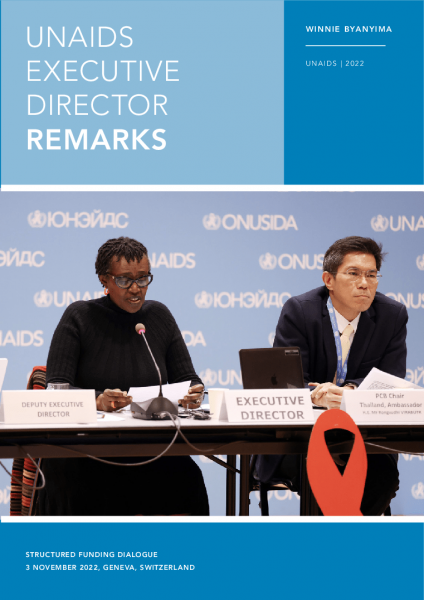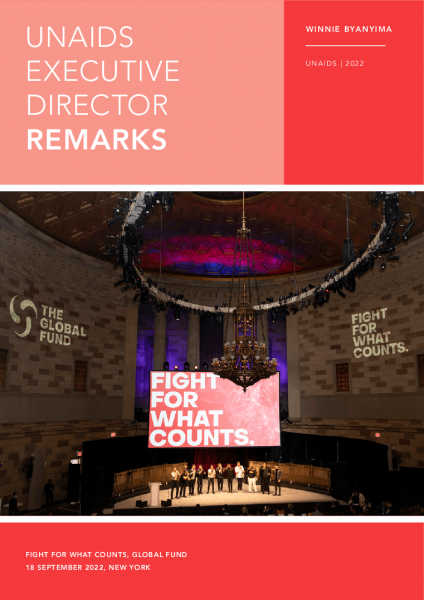UNAIDS Executive Director calls for immediate investment of $35 million in end-of-year funding and a commitment to increase the operating budget to $210 million for 2023
GENEVA, 3 November 2022—Board members of the United Nations Joint Programme on HIV/AIDS (UNAIDS) have met to discuss how to address a $35 million funding gap in the organization’s minimum operating budget of $187 million which is undermining efforts to end the AIDS pandemic as a global health threat by 2030. The budget required to fully meet the organization’s operational needs is set at $210 million.
In his opening remarks at a special meeting held in Geneva to discuss solutions to the funding gap, the Ambassador of Thailand’s Permanent Mission to the United Nations Office in Geneva, Rongvudhi Virabutr, the current chair of UNAIDS Programme Coordinating Board, said that the Joint Programme continued to have an important role in data collection and analysis to develop evidence and mobilize political leadership.
“As the largest funder of AIDS responses said earlier this year, the Joint Programme is “the North Star", without which we are all blind. A fully funded and effectively functioning Joint Programme is key to our collective success. We have no time to waste.”
Calling for an immediate release of $35 million in end-of-year funding, UNAIDS Executive Director, Winnie Byanyima said that the organization’s financial position had deteriorated even further since the last meeting of the UNAIDS PCB in June. She said that the war in Ukraine and movements in currency exchange markets had aggravated the situation.
“The size of the budget shortfall means that it cannot be addressed by stretching the budget or finding any more efficiency gains. It is forcing stark choices—a dramatic reduction in UNAIDS country presence or further reductions to our co-sponsors are some of the scenarios,” said Ms Byanyima. “These choices are devastating, and all scenarios will set the global AIDS response back even further by denying HIV prevention, treatment and care services to millions of vulnerable people.”
UNAIDS has taken significant action to resolve the funding gap by instituting budget discipline, developing a new resource mobilization strategy and working closely with a specially appointed task team made up of members of the PCB to come up with actions and recommendations to strengthen the financial position in 2023.
UNAIDS co-sponsors, communities of people living with and affected by HIV and civil society organizations have all called for UNAIDS to be fully funded so it can achieve is vital mission.
“The world is in danger and now our collective efforts in addressing the Sustainable Development Goal of eliminating HIV/AIDS as a public health threat is at stake,” said Christian Hui of the Prevention Access Campaign, Canada. “We cannot deny the contribution of the Joint Programme. Civil society, especially marginalised and key populations, have hugely benefited from the Joint Programme to advance access to lifesaving antiretrovirals and to combination prevention, to advance human rights and to empower communities to take an active part in HIV programming.”
Recognizing the complementarity of UNAIDS work, other partners in the HIV response, including the Global Fund to Fight AIDS, Tuberculosis and Malaria and the United States President’s Emergency Plan for AIDS Relief (PEPFAR) have also added their voices for UNAIDS to be fully funded.
UNAIDS is present in 70 countries worldwide working in partnership with governments, civil society and communities, collecting the data that shapes the HIV response, advocating for the reversal of harmful laws and policies to create an enabling legal environment, working for an end to HIV-related stigma and discrimination, and challenging the inequalities driving the HIV pandemic among vulnerable and marginalized groups of people. In 2020-2021, UNAIDS supported more than 80% of applications to the Global Fund, guiding $5 billion in HIV funding.
“We would like to call upon all stakeholders for increased support, coordination and collaboration with UNAIDS to address the unfinished agenda of saving lives and leaving no one behind in our efforts to end AIDS,” said Alegnta Gebreyesus Guntie of the Permanent Mission of Ethiopia to the United Nations Office in Geneva.
“UNAIDS support to countries is on developing data-informed, science-based strategies tailored to the epidemic and developing plans to implement them well,” said Ms. Byanyima. “Now, the work of the Joint Programme is needed more than ever to help countries to be ready for the next round of Global Fund applications in a difficult allocation environment.”
The UNAIDS Global AIDS Update In Danger reveals an HIV response faltering in the wake of the COVID-19 pandemic, the global economic crisis, and the war in Ukraine. A total of 650 000 people died of AIDS-related illnesses in 2021 and there were 1.5 million new HIV infections—1 million above the 2020 target of 500 000. New HIV infections increased in 38 countries.
“UNAIDS is working tirelessly to reverse the trend and to get the HIV response back on track.” said Ms. Byanyima.
UNAIDS
The Joint United Nations Programme on HIV/AIDS (UNAIDS) leads and inspires the world to achieve its shared vision of zero new HIV infections, zero discrimination and zero AIDS-related deaths. UNAIDS unites the efforts of 11 UN organizations—UNHCR, UNICEF, WFP, UNDP, UNFPA, UNODC, UN Women, ILO, UNESCO, WHO and the World Bank—and works closely with global and national partners towards ending the AIDS epidemic by 2030 as part of the Sustainable Development Goals. Learn more at unaids.org and connect with us on Facebook, Twitter, Instagram and YouTube.




